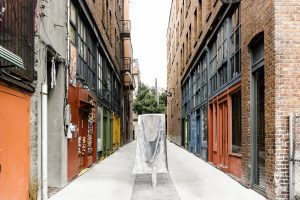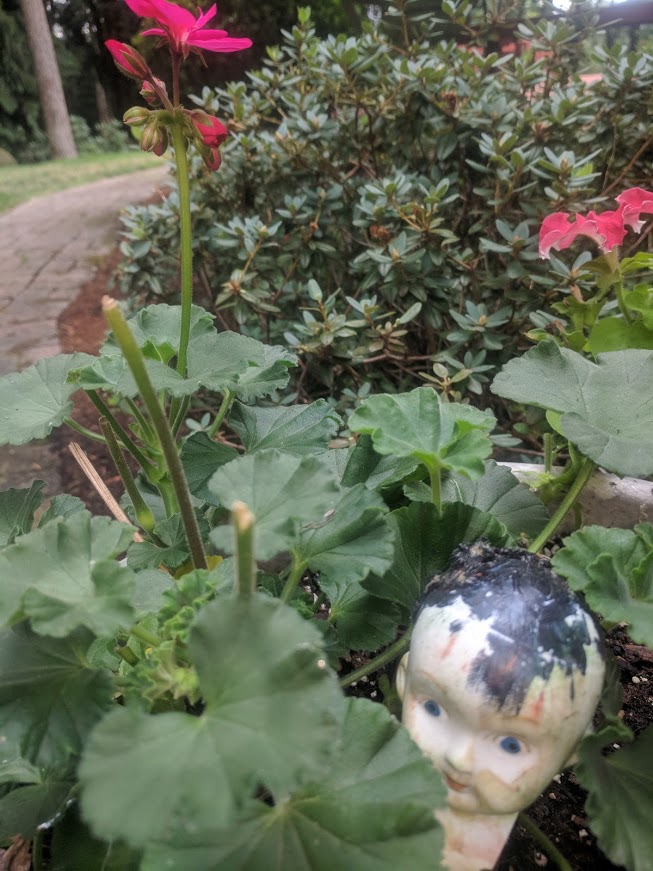
“Don’t hide yourself from the world and don’t let the world hide himself from you!”
Mehmet Murat ildan
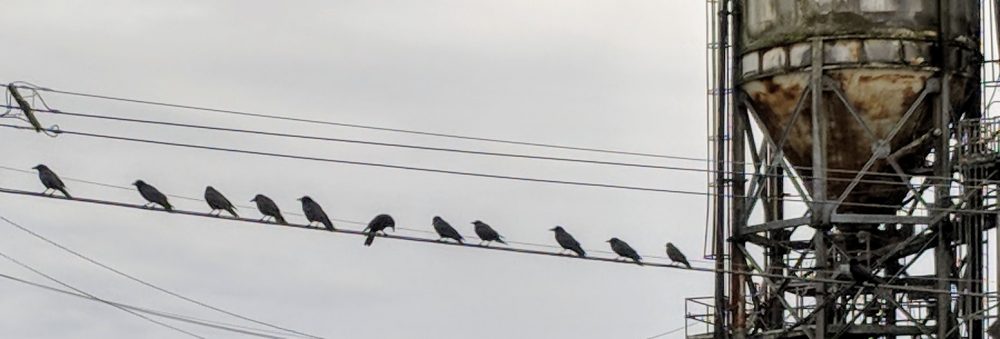

“Don’t hide yourself from the world and don’t let the world hide himself from you!”
Mehmet Murat ildan
“Letting go gives us freedom, and freedom is the only condition for happiness. If, in our heart, we still cling to anything — anger, anxiety, or possessions — we cannot be free.” — Thich Nhat Hanh

Part 1.
It was a cool spring evening in 1999. Sylvia sat at the side of the bed holding her grandmother’s hand as her grandmother shared stories of her life as a young lady in Hitler’s Germany.
I was just 16 when my parents were deported and I had not seen them since. I was placed in an orphanage and worked at forging papers to enable French forced laborers to cross back into France. “I could never accept that I should be killed for what I happened to be born as, and so I decided to give the Germans a better reason for killing me.”
In the summer of 1943 I tried to escape to France with forged passports, but was caught and deported to Auschwitz. My stay in jail turned out to have been a blessing in disguise. I traveled on a prison train separately from the people who were generally sent straight to the gas chambers on their arrival.
While on the train I met an American music teacher. At the time I had no idea of the role he would play in my future life.
As Sylvia sat and held her grandmother’s hand she was wondering why she had never heard any of these stories before. Her grandmother dozed off and then woke a few minutes later asking where she had left off. Sylvia said, “you had been arrested and you just met the American music teacher.”
Oh yes , said her grandmother and she continued where she left off.I was fortunate to have been classified as a criminal and not as a Jew, once at the prison I let it be known that I could play the cello so I was introduced to the orchestra of prisoners. The cello saved my life. We played as enslaved laborers. We left the camp every morning and returned every evening. None of us ever believed we’d actually leave Auschwitz some other way than through the chimney.
Grandmother dozed off again and Sylvia stayed by her side so that when she woke she would be able to hear more of this story that had never before been talked about. Sylvia’s grandmother didn’t wake up from her nap.
Part 2.
Now that her grandmother was gone Sylvia felt obligated to spend more time her grandfather so she went home and packed up a few things and returned to her grandparents’ house. While her grandmother was drifting away her grandfather seemed to be getting more and more confused . Her grandmother had been in denial of his diagnosis of dementia. Some days were better than others. He was unable to remember things she told him just minutes ago but he seemed to recall events of fifty years ago as if it were yesterday.
While she was making room for some of her own things in the closet, tucked away in the far corner, Sylvia found an old violin case. The case seemed to have seen better days. When she opened the case there was an old violin and bundles of letters wrapped together with a ribbon. She wondered if she should ask her grandfather about the violin and letters and decided to push the case under the bed and pick another time to bring it up with her grandfather.
Later that night Sylvia’s mind was racing with curiosity as she thought about the violin case and the letters that were hidden inside.
This was a mystery and she wondered if it was connected to the stories her grandmother was sharing on her deathbed. Feeling tired and a bit overwhelmed she slipped into her nightgown, had a cup of tea and drifted off to sleep.
Part 3
Over breakfast the next morning, Sylvia asked her grandfather about her grandmother, hoping to gather enough information to put together a beautiful obituary. With tears running down his cheeks, her grandfather instead begins rambling on about his one true love, Natalina… Sylvia corrected her grandfather and he started to get frustrated and angry. Her grandmother had a way of keeping her grandfather calm and Sylvia was wondering how she was ever going to be able to manage his tantrums and care for him on her own.
Later that day while her grandfather naped, Sylvia decided to remove the violin case from under the bed, she opened the case and took the first stack of letters out. As she held them in her hands she studied them carefully, looking at the elegant handwriting on the envelopes, Inside the first letter the paper was brittle and the ink was disappearing . Sylvia soon realized that going through these letters was going to take some time.
Part 4 Frederick
In 1932 Young Frederick Zoref was traveling through Europe playing his violin and teaching. By 1933 Anti-Jewish violence in Germany and throughout Europe was on the rise. Frederick decided to change his surname to Zorin , which sounded more Russian than Jewish in an attempt to escape attention and to be able to continue performing. Frederick was teaching violin in Riga when German forces invaded and occupied Riga in the summer of 1941 at this time Fredericks violins were confiscated. To survive Frederick began work as a slave laborer for the Gestapo. Jews were being moved to the ghetto in the so called Moscow suburb of Riga and thousands of jews living in the Riga Ghetto were taken to the Rumbula forest, shot and buried in mass graves. Among them were Fredericks parents.
Frederick, along with many other survivors, were sent to Auschwitz and then off to camps. Upon arrival Frederick made it known that he was an American violinist and so he managed to get himself on a separate train to audition for the prisoners orchestra.
Part 5 Irena
Sylvia placed her grandmother Irena’s Obituary in the local paper and made all the funeral arrangements. A few days later when she checked the mailbox she found it stuffed with dozens of sympathy cards from friends and strangers alike. She was curious about who some of the letters were from, but was unable to learn anything meaningful from her Grandfather, who keeps referring to her Grandmother as Natalina.
While going through her Grandmothers office Sylvia came across an old address book and instantly skimmed through looking for the name Natalina in hopes of being able to make some sense out of her Grandfathers rambling, but no such name was anywhere to be found . Feeling disappointed Sylvia decided to spend some time reading through some of the old letters she had set out.
It was late in October 1944, each day the laborers marched to work as the members of the prisoners orchestra played for their lives.The orchestra played outdoors year round,in snow, rain , hail and in the summer heat,seldom being fed or given water to drink. Marching to work to the music of the orchestra was intended to help keep the labours in line.
Irena Markstein had been performing in the women’s prison orchestra for just over a year it was a miracle that she had survived this long. Most members of the orchestra were lucky to survive a few months as they were worked to death. Irena was an extraordinary & gifted cellist and had made a sympathizer out of an German admirer for her musical ability. The sympathizer would leave scraps of food in her cello case in hopes of helping to keep her healthy. Irena rationed the scraps and wished she could share them but this was all that was keeping her alive. She did not want to risk getting her sympathizer caught and she certainly did not want to be accused of stealing. She was careful to keep the scraps secret and ate then in her bad at night while everyone was sleeping.
On November first of 1944,everything changed. With no notice all the Jewish members of the women’s orchestra were rounded up and evacuated and sent to another camp in Germany never to be seen or heard from again.
Irena was left behind as she was categorized as a criminal and not a Jew. Later that month Auschwitz was dismantled and the remaining members of the orchestra were sent to Bergen- Belsen. They were transported in over crowded cattle cars and many died from disease, although Irena was badly beaten and nearly died of Typhus but she survived the journey.
Before leaving Auschwitz, Irena had been warned by her German sympathizer that she would need to try to escape at all cost as the orchestra was being moved and there were rumors that they were all scheduled to be shot to death.
Part 6 Frederick
Sylvia is tired, exhausted, and had not been able to sleep in days. Her grandfather had been keeping her up at night with his screaming and crying, she could hear him calling out for Natalina in the night. She was angry that he doesn’t seem to recognise that his wife, her grandmother, has passed. She’s hoping maybe Natalina will show up at the funeral this afternoon, or at least she will meet someone there that knew Natalina. Missing her grandmother , trying to care for her grandfather , not sleeping and not having much of an appetite Sylvia was feeling a bit overwhelmed. She wanted answers and wanted to understand what might be causing her grandfather to be asking for a stranger.
Going from a horrible situation to a worse situation in the fall of 1944, Frederick and a number of other laborers were deported to Burggraben. Where he was able to work as a Laborer in the shipyards until the Germans decided to move all the prisoners ahead of the Ally advance.
At the new location Frederick was recruited into one of the many groups that were sent out on death marches. The purpose of these marches was to remove evidence of crimes against humanity committed inside the camps and to prevent the liberation of German-held prisoners of war.The marches were brutal if you fell out of the march you were left for dead or shot, you were lucky to be shot. By now Frederick was not sure that he would ever get his life back he was sure he would die here.
Fredericks group made it to Gotentov, where they were liberated on March 10, 1945, by the Russians, after which Frederick , with the help of the Jewish underground was sent to a Soviet repatriation camp in Poland where with the help of the Jewish Underground he was able to escape and made his way through Poland to Bavaria which was part of the American militarized zone in south Germany. Frederick spent nearly two years waiting to immigrate to America.
During this time he did what he could to earn a living, he chopped and sold firewood and sold his ration coupons to make extra money so that he could buy a new violin. He met a Bavaria piano player, Natalina Barosky, who was also waiting for papers to immigrate to American she helped him get a new violin and she helped him find students so that he could earn extra money. Fredrick and Natalina were married and just weeks later Frederick got his papers to go to America.The couple had a plan, Frederick would go ahead to American and work and find a place for them to live and Natalina would stay and teach piano in Bavaria until her papers for immigration came.
Part 7
The funeral service was modest but well attended, mostly close friends and neighbors that had know both her grandparents.
While at the cemetery, a man approached Sylvia, he offered his condolences and introduced himself as Eugene Johnson, the symphony conductor that had worked with Irena when she came to the US. With tears in his eyes he started to recall meeting Irena, “Ricky told me she was coming to Dallas to bring him a package and that she had been a friend of his wife. When I saw her I remember thinking she was much too thin and frail to be able to play like Ricky said she could but I trusted Ricky as he had been my first chair violinist for a year and until meeting him no one I knew could play like he did . I don’t know Irena survived the journey alone with his Natalina’s infant . But when she sat with her Cello and started to play for me she become one with it. Eugene paused to take a hanky out of his pocket to dab the tears that were rolling down his cheeks and then he continued to say, “ she was the most passionate and talented cello player I have ever met. “
Sylvia was confused , a package, a baby, her grandfather never mentioned having had another wife? Feeling alone and filled with grief curiosity ,stress ,frustration and , Sylvia had even more questions now as she was now aware that she hardly new her grandparents at all . She had a thousand questions for Eugene but this was really not the time to ask as the guests were all coming to her to convey their sympathies for her loss. She just kept thinking to herself , finally someone with a clear mind that knew of Natalina and both of her grandparents way back when.
Part 8
Irena was a survivor, now at the overcrowded Bergen-Belsen, conditions were much worse. People were dying of malnutrition and Irena witnessed some instances of cannibalism. She was trying to plan an escape but had witnessed the deaths of many others who had tried. She had not endured all of the pain and suffering just to be shot in the back now. Remembering what she was told before leaving Auschwitz, she knew she needed to move up her escape plan if she wanted to get out of Germany alive. Just days before Irena was planning to attempt a get away British troops freed the camp on April 15, 1945. She heard that she could get work in Bavaria playing in an orchestra and so she made her way there with the help of the Jewish underground once in Bavaria she was introduced to a pianist Natalina Barosky who helped her find work and the two women quickly become friends.
Part 9
Frederick was in the US working as a music teacher in Texas and performing in the orchestra. He was saving as much as he could so that when Natalina received her papers he would be able to get a better home for them.
Natalina was now six months pregnant and she still had not been given immigration papers. Natalina and Irena were becoming like sisters and were now sharing a small place and scrimping and saving what they could as they were hoping to be able to make the trip to American together. Natalina was hesitant to share with Fredrick that she was pregnant as she did not want to add additional stress for him but she finally wrote to him to let him know that she was with child.
Natalina’s English was not good so she called her Frederick Rick for short. She was filled with warmth when she received a letter back with some white baby booties. Her Rick was excited about having a child. The couple wrote letters as often as time would allow. They shared hopes and dreams and plans for the future, they were excited about raising a child in America and working for the symphony.
Chapter 10
Sylvia finally had a chance to get some rest and was able to go through the rest of the letters with a fresh mind.
After the death of Natalina, Irena knew that she had to write to Rick to let him know that he had a daughter and that Natalina had died in childbirth. Irena was caring for the child as if it were her own and when she finally notified by immigration that if she could prove that she would have a job or a husband in the US her papers would be approved before the end of the year. People seemed to like and trust Irene so when she explained that the babies mother had died in childbirth and the father was an American, she was granted permission to travel with the child to America as the child’s nanny.
The voyage across the ocean with a young infant was not easy but Irena had seen much worse times.
When Irena first arrived in Dallas she was spending all of her time caring for Rick’s daughter she had not had time or the energy to play her cello. She was starting to give up on her dream of playing the Cello for herself. It wasn’t until one late , hot summer night that she could not sleep that she got up out of bed and took her cello outside. She started out playing softly under the night sky. Rick was awoken by the music and got up and sat in the shadows on the back porch and listened to her play. He has never heard anyone play with such passion.
The next morning while Irene and Rick had breakfast Rick told Irene that he had heard her play and that he thought she needed to audition to play in the Dallas symphony.
Oh no , who would care for the baby? Rick would figure that out later and went ahead and invited the conductor over for dinner where he would then ask her to play a song or two.

I don’t make friends easily and I have always had trouble spending time with more than one person at a time. I had one main friend from 4th grade until I got married the first time. Yes, I talked to a few other people but I was not the kind of girl that wanted to be invited to all the birthday parties. I was the girl who was perfectly content laying out in the yard alone looking at the stars at night and going of on long walks or bike rides alone during the day. Some of my friends and family members get annoyed at my one person at a time preference but it works for me. Yes, I have been known to show up at a social event from time to time but if I don’t have a job to do while I am there I am pretty much lost.
In the past two weeks I have lost 6 dear friends. These were 6 people that I bonded with and 6 people that understood me and accepted me for how I am. These were 6 people who took time to spend quality time alone with me. I am not going to apologize for how I am I am just letting you know that I am just more comfortable being around one person at a time.
During this time of grieving I have been focusing on flowers and bugs and self care as well as being grateful for friends who love me and care.
The tree in the above photo was something I saw today while walking through a garden. The bark was rough yet beautiful while serving as a host for many it was slowly being damaged.
Three things cannot be long hidden: the sun, the moon, and the truth.

“We are what we pretend to be, so we must be careful what we pretend to be.”
– Kurt Vonnegut

https://www.sooscreekbotanicalgarden.org/
Kurt Vonnegut, the acerbic American author, rose to fame with the novel Slaughterhouse-Five, loosely based on his experiences as a prisoner of war during the World War II bombing of Dresden. He was born in 1922 in Indianapolis. His fiction, a blend of science fiction and satire, became hugely successful in the 1960’s. Three of his seven children are his sister’s, adopted after her husband died in a train wreck and she died of cancer a day later. He lived in New York until his death in 2007.
I walked through a garden that was once a location of a garbage dump. It is amazing how a place can be transformed with some hard work, passion and love. This rock reminded me about how I want to be a positive reflection in the world.

Maybe it is my recent state of mind but I seem to see pain everywhere I look. This reminds me of human wounds.



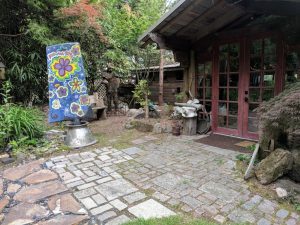
I have been house sitting for the past few weeks and the property I am watching is filled with amazing art. In talking to the owner Jill Drllevich I asked her about a particular piece and here is her story.
“I was born on January 8th, 1950 in Brooklyn, N.Y. My parents moved shortly after my birth to Long Island. I was raised in a home that encouraged inquisitiveness and experimentation. We were taught that with determination and hard work anything is possible. The worst thing we could possibly say to our dad was;” I can’t”. At the age of 36, with 4 children at her side, my mother went back to college to earn her Master’s in Education. My father, with just a high school diploma, was asked to travel the U.S. teaching Quantum Physics.
Growing up in New York at that time was an amazing experience. With WWII behind us the American dream was a possibility. We were taught in college about utopias and the endless possibilities of the Utopian world. The TV shows we watched depicted the “perfect family”, FATHER KNOWS BEST, Leave It To Beaver, and The Andy Griffith Show.
Unfortunately world events were not cooperating with these utopian dreams. President Kennedy was assassinated, the civil rights movement was being met with strong opposition, the fear of a Russian invasion was ever present, the Vietnam War was heavy on all our minds and Nuclear Power was introduced to a world still fearful from the devastation caused by the atomic bomb.
I, like many of my contemporaries, put myself in the middle of it all. I marched for peace, I participated in “sit-ins”, and I protested the building of a nuclear power plant in our own small community. Rallies were being held on what seems like a weekly basis to protest the building of a local nuclear power plant in Shoreham, N.Y. Some protestors even burned their electric bills. I was always taught to follow my heart so, I didn’t just burn my bill, I shut my electricity off, For four years , while raising two small children.. In the end the protestors won due to the fact that there was no viable evacuation route in case of a meltdown or some other nuclear disaster.
With a true pioneering spirit I moved my family to Washington State in the mid-eighties.
It seems that at the same time I was protesting the proposed construction of the Shoreham Nuclear power Plant, Washington State residents were duking it out over the construction of two new power plants to be an addition to the existing Hanford Nuclear reactor. As with Shoreham, these plants were never completed. As a result there was an enormous amount of structural waste. All of the fan blades that were to be used in the cooling towers of the Satsop Nuclear plant were scrapped and sent to a recycler in Tacoma.
The rest of the story begins here. I bought all the fan blades and their wooden carriers with the dream of turning them into life changing; interactive moving sculptures powered by the many forms of natural energy. My vision and hope is to invite artists and sages from diverse cultures to come together with words and imagination that will promote reflection and introspection, to then turn these blades into sculptures that inspire and empower. I envision them traveling to the many people and places on Earth that have been scarred by the misuse of this mighty power. I see the project almost like “turning weapons into ploughshares”.
These blades stand about 5 feet tall and are hollow inside which allows the artist to carve away pieces of the blade so that they can turn and spin and move as one. My mind is filled to the brim with ideas. Now I need artists to create, thinkers to paint words of wisdom, promoters, managers, writers, investors and anyone else that can see the need to heal and encourage stewardship and sustainability of this precious planet.

This is an evolving ongoing multi-faceted project that was highlighted at the 2018 Seattle Design Fair under the name, POWER OF TRUST ”
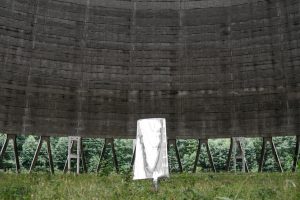
As I sit in the porch swing in Jill’s front the yard and I look at the beautiful blade she has here I am trying to think of a way to help make her dream come true. I have included some photos of how these blades would look in different settings.
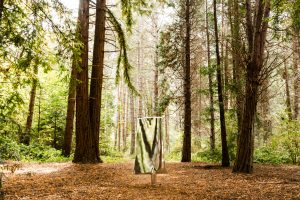
If you know of anyone who would like to be a part of the Blades of Change project please send me an email to evergirlart@gmail.com
